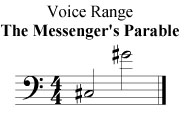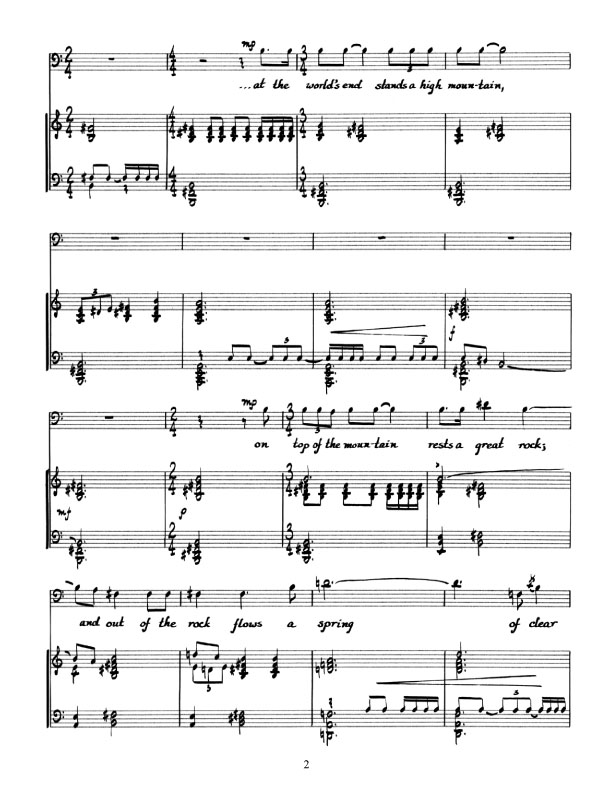Lyrics adapted by Frank DiGiacomo from the play by S. Ansky. Based on THE DYBBUK, translation © 1974 by S. Morris Engel, published by Nash Publishing Corporation, New York.
Serving as the Prelude to Act Three, sung to a tableau of the assembled Batlonim in the synagogue. The Messenger is an enigmatic character, personifying divine intervention: an angel, perhaps. The story he tells is a microcosm of the entire drama playing before us, and based on an ancient Chassidic tale which tells, in symbolic form, the Kabbalistic story of the relationship between the world and God.
(The Batlonim, the Rabbi Azrielke, Hennakh, Sender, the Messenger, Fradeh, and Laia’s friend Gittel are all involved in the Exorcism which would have formed the bulk of the incomplete Act Three. They have discovered the circumstances surrounding the intended betrothal of the two children, and this, coupled with his own fear of casting Khannon’s soul into the outer darkness, fills the Rabbi with misgivings over the rightness of the Exorcism. Despite the anguish of the spirit and his intense hold on Laia, the Rabbi, with a tremendous effort, casts Khannon’s soul from Laia’s body and orders her immediate preparation for the wedding with Menashe, as planned.)
The recording is of a performance by William (Bill) Black, accompanied by the Composer, at the recital An Evening of New Music by Frank DiGiacomo, on May 18, 1977 at the Carrier Theater of the Mulroy Civic Center in Syracuse, New York.

LYRICS
The Messenger:
(as if in the middle of a recitation)
...at the world’s end stands a high mountain,
on top of the mountain rests a great rock;
and out of the rock flows a spring of clear water.
At the other end of the world lies the heart of the world,
for everything in the world has its heart
and the whole world has a great heart.
Now the heart of the world never takes its eyes
from the clear spring of water,
but gazes at it with passionate longing,
yearning and thirsting for the spring of clear water —
but it cannot take even the smallest step toward it.
For if the heart makes one move from its place
it will lose sight of the peak of the mountain
with its clear spring.
And should the heart of the world
lose sight of the spring, even for one second —
even for one second! — the world begins to die...
The clear spring is without time of its own,
and it lives only by the time it is granted
by the heart of the world.
One day is all that it is given;
at the end of one day the spring begins to sing,
to sing to the heart of the world;
and the heart of the world sings its own song to the spring.
Their songs come together, and spread over the whole world!
And gleaming threads emerge from that song
and reach out to the hearts of all things in this world,
and tie one living heart to another.
Then a man of grace and goodness walks through the world.
He gathers these threads from all hearts,
and weaves them into time.
When he has woven one day
he presents it to the heart of the world,
and the heart of the world
presents it to the clear spring,
and the spring lives to sing one more day.
